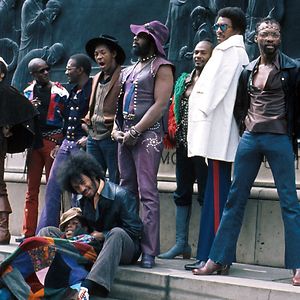Parliament
Parliament-Funkadelic (abbreviated as P-Funk) is an American music collective of rotating musicians headed by George Clinton, primarily consisting of the funk bands Parliament and Funkadelic, both active since the 1960s.
Their distinctive funk style drew on psychedelic culture, outlandish fashion, science-fiction, and surreal humor; it would have an influential effect on subsequent funk, post-punk, hip-hop, and techno artists of the 1980s and 1990s, while their collective mythology would help pioneer Afrofuturism.
The groups released albums such as Maggot Brain (1971), Mothership Connection (1975), and One Nation Under a Groove (1978) to critical praise, and scored charting hits with singles such as "Give Up the Funk" (1975) and "Flash Light" (1978). Overall, the collective achieved thirteen top ten hits in the American R&B music charts between 1967 and 1983, including six number one hits.
The collective's origins date back to the doo-wop group the Parliaments, formed by Clinton during the late 1950s in suburban New Jersey.
By the late 1960s, Clinton had gained experience as a producer-writer for Motown Records and, under the influence of artists such as Jimi Hendrix, Sly Stone, and Frank Zappa, he relocated to Detroit and enlisted musicians from his New Jersey days in his own two sister bands Parliament and Funkadelic; the first would go on to develop a commercially successful style of science fiction-inspired funk, while the second blended funk with psychedelic rock.
Prominent collective members have included bassist Bootsy Collins (who formed the spinoff group Bootsy’s Rubber Band), keyboardist Bernie Worrell, guitarists Eddie "Maggot Brain" Hazel, and horn players Fred Wesley and Maceo Parker.

